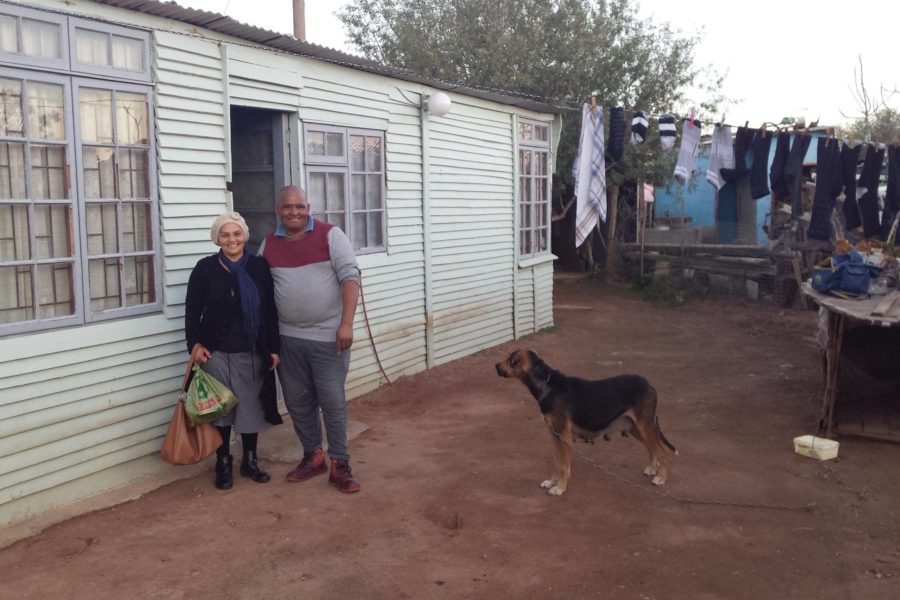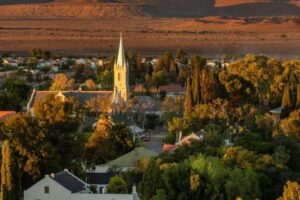Living for Jesus…? What does it mean in down-to-earth practical terms? Here’s a good example…
I recently visited my in-laws in the picturesque valley of Robertson in South Africa. We stayed in the lovely home of my wife’s brother and his family. One morning I overheard their domestic servant saying to my wife how she loves to do her work to the glory of God. She said it so humbly and spontaneously that it surprised me. I thought by myself: we who are at risk of entirely losing our “Protestant work-ethic” here in the northern hemisphere can certainly learn from her.
So I asked her if she would be willing to sit down for an interview one day after work. She speaks Afrikaans as I do. The interview gives a peek into the daily life of a Coloured[i] woman and domestic servant, 25 years after Apartheid. The Coloureds (or Brown people) are descendants in culture, faith, and blood of the native Khoi who lived at Cape, and the ancient Dutch and French settlers who began arriving there since the 1650s. So here we go…
CFH: Good morning Jocelyn! Thank you for being willing to sit down with me for an interview for Christian Renewal. I heard you said to Margherita so spontaneously how you love to do your daily tasks to the Lord and for his glory! It was so good to hear that. What do you mean by that?
JM: It is just because I love my work dominee[ii] and I want to it properly.
CFH: What difference does it make if you do it for Him or simply for a human being?
JM: It makes a huge difference, for then I can show to the other person what is inside of me, for I do not simply do my work hastily to get it done. I want to bring glory to God.
CFH: Why is it important to do it for God? I can imagine that one can easily become discouraged or bored if you simply work for an earthly boss, right?
JM: I never find my work boring. Every day I am excited to come to work…
CFH: Is it not also because you do it out of love for those you work for?
JM: Indeed!
CFH: How much is such an attitude needed in the world today Jocelyn! Also where I come from. How does it feel to work for people who have so much more than you in materially speaking?
JM: That’s a reality you have to deal with, that you have much less than the people you work for. But it does not bother me at all. I say every day to myself that what they have God has entrusted to them. And what they have, they always share with me, so it does not bother me at all, even if they have much more than me. I always pray that the Lord might bless them so that they may bless me, or somebody else who is less privileged.
CFH: The Lord has given you wonderful perspectives Jocelyn. How long do you know him?
JM: For about 14 years dominee.
CFH: And how did you come to know him?
JM: My husband was addicted to drugs, and I had to do something to take the lead in our home. I started to pray because having been raised in a Christian home, I knew I had to pray. So I went down on my knees multiple times talking with Jesus, and that is how a huge transformation took place in my own life. Then I spoke much to my husband. I prayed much for him too, until he decided: “I am done with it (the drugs).” I always told him: “To send you to rehab may help a bit, but it cannot help you as only Jesus can. Jesus can change you totally”. That’s how I led him to Christ.
CFH: Wonderful! So you are both now serving the Lord? And are you happily married?
JM: Yes we are!
CFH: What is his name?
JM: Desmond. Our last name is Michaels.
CFH: You said you were raised in a Christian home. So the Christian faith came to you across many generations?
JM: Indeed
CFH: Have you ever looked back on how long your ancestors have been Christians?
JM: No, I have never done it.
CFH: Jocelyn, so people say today that everything of the past was bad, I mean colonialism. I know there was much that was wrong, but there was also some good, don’t you think?
JM: Yes there was…
CFH: Because those people (from Europe) brought the Christian faith here?
JM: It is what I always say in my home, in the former days, say in the Apartheid years, it was better, because Jesus was honoured, and more people believed in Him, and Jesus was always mentioned in parliament, but now it’s different.
CFH: May I ask you something: My people, the white people, did they do you and your people a lot of harm in those years? You may be candid. I don’t mind… Is there lots of pain in your heart from those years still?
JM: I would not say for myself, maybe for my parents.
CFH: What would you say was the essence of the hurt? What was it really that hurt your people?
JM: I don’t really know why they experienced it as such.
CFH: Did we look down on your people, or was it simply the divisions apartheid imposed upon our nation?
JM: For me, it was always this: because they were white they thought they were better than us… and because they were wealthier, they thought they were better…
CFH: And the system benefitted us, while you folks, on the other hand, were disadvantaged in many ways… As someone who was born in 1962, I feel I share in the guilt of what went wrong, even though I know my own parents always tried to treat Black people with respect, and I also know not everything was bad. Yet I am truly sorry about what was so wrong and unfair… I wish I had spoken out more clearly then. But the Lord is merciful, isn’t He?
JM: That is what’s so wonderful about forgiveness. We must begin with forgiving ourselves when the Lord forgives us, and then forgive each other. The Lord is so great and so merciful.
CFH: So where do you worship Jocelyn, at which church?
JM: I am at Moving Souls for Christ… a little house-church here in our town.
CFH: Is the Word preached faithfully there?
JM: It is indeed dominee!
CFH: How many of you worship there?
JM: We are about twenty….
CFH: Do you have a pastor?
JM: My husband leads our worship.
CFH: Wonderful! May the Lord give him much strength and grace!
CFH: Jocelyn, you said that in those old days Jesus was more central to life. What is the biggest challenge people like you face here in South Africa today?
JM: In my opinion, it is the problem of addiction.[iii] These folks (addicts) always draw my attention and I love to help them and to tell them how real transformation can happen… I want to lead them to Jesus, especially the young people.
CFH: Are there young people in your town who serve the Lord?
JM: Yes, there are many who serve Him dominee.
CFH: Wow that is wonderful to hear…. And tell me do you read your Bible regularly?
JM: Oh yes I read it very regularly. Anytime during the day or during the night, also here, when I feel the need, I read my master’s Bible, or the lady’s in her bedroom…
CFH: How do you think about South Africa’s future?
JM: It looks to me that war is coming because we say apartheid is gone, but in my opinion, that is not true.
CFH: What do mean by that?
JM: I mean that when you watch the news and you listen it is always: “We blacks, we blacks, we blacks….” It goes on like that all the time. At the end of the day, how can you say things have changed but you always refer to your own race when you talk about any issue? That is what they do all the time.
And now, with this land issue, when they say that the white people took the land long ago, and now they are going to take it back, I said to myself: “War is coming”! I once read in the Bible that nation will rise up against nation, and I see it coming.
CFH: Hmm… I do not think you are far from wrong… So there’s lots of work for us Christians?
JM: There is lots of work… I told my husband if only I had time to walk around all day telling people: “Change your life!” I would be so happy!
CFH: And your children? Do they believe in the Lord?
JM: They believe wholeheartedly in the Lord Jesus.
CFH: But you said to me yesterday that they do not really have a choice…
JM: No, they do not have a choice… they must believe in the Lord Jesus, especially since the days are so evil. I told them as long as you under my roof, we talk about Jesus. When you go and leave our home to get married, then you can decide what you want to do… But as long as you are living here… then we submit to the Lord Jesus.
CFH: That is wonderful to hear Jocelyn! How old are they?
JM: My oldest daughter is 23, my son is 18 and my little girl is 15.
CFH: Jocelyn, may I ask, are there still white people, Afrikaner people, who look down on your people?
JM: To be honest dominee, for the seven years that I have worked here, I have spoken to so many white people, and truly, there is so much change. Truly I feel when I talk to them, that we have known each other for a very long time. It is like talking to my sister, to someone close to me,
CFH: That is wonderful, that gives me so much hope. That is what people ask me there where I live in Canada: “Is it going better in South Africa, in the relationship between the different races?” My experience is also that it is going much better with the large majority, but that there are always those on the fringes who want to fan the flames of division.
CFH: One last question Jocelyn: Do you realize that you live in one of the most beautiful parts of the world? Truly, I am not exaggerating!
JM: No dominee, I have never realized that. I am glad that you told me…!
CFH: Jocelyn, thank you so much for this interview. It meant so much to me and I hope to our readers too. May the Lord bless you and your family abundantly.
When we arrived at her home… her husband came to the gate. I told him why she was late from work and also that I will write about his conversion too. He raised his hands spontaneously to the heavens and exclaimed: “All glory to God!
Thinking back of Jocelyn and her husband… as I sit here in Canada I keep on thinking of the powerful beautitude of Jesus: “Blessed are the meek, for they shall inherit the earth”. I am sure the Saviour was thinking of such folk.
[i] This term gives no offense in my old country. It is used interchangeably with “Brown People”.
[ii] She addressed me as “dominee”- Dutch for “reverent”- throughout our conversation.
[iii] This problem is particularly severe among the Coloured People but is increasingly becoming worse among all population groups, just like here in North America.








